Ryan Holiday: "The best way to understand what's happening in the world right now is by reading books."
Today's Essential Reading
Books that help you understand the deeper currents shaping our world right now.
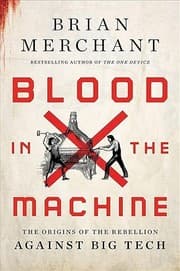
Blood in the Machine
by Brian Merchant
True story of the Luddite rebellion, tech history, and how it prefigures today's struggles with automation and big tech.
Why this book matters now:
- •The book discusses the Luddite rebellion as a response to the introduction of mechanization, paralleling today's concerns about automation and job displacement caused by technology.
- •Merchant highlights the historical struggle against the power of large tech companies, which mirrors current conflicts regarding corporate influence in politics and the economy, particularly in the context of monopolistic practices.
- •The themes of resistance against technological change and the impacts of automation on labor resonate with ongoing debates about the future of work, especially as new technologies emerge and disrupt existing systems.
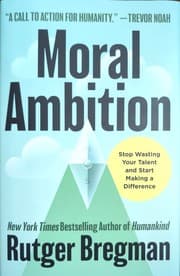
Moral Ambition
by Rutger Bregman
A manifesto urging people to use their talents for large-scale social good rather than conventional personal success.
Why this book matters now:
- •The book's emphasis on using personal talents for social good resonates strongly with the current political climate and the ongoing investigations into accountability and governance, as seen in the Jan. 6 hearings. It encourages a shift from self-serving actions to those that benefit society as a whole.
- •With rising health issues such as the spread of measles and the ongoing debates around vaccine exemptions, Bregman's call for moral ambition can inspire individuals and communities to take proactive steps in public health advocacy and education.
- •The discussion of technology in the context of large-scale social good ties into the recent headlines about breakthrough technologies. Bregman's ideas encourage innovators and technologists to focus on solutions that address societal challenges rather than solely pursuing profit.
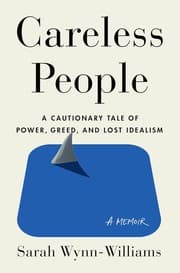
Careless People
by Sarah Wynn-Williams
Candid memoir by a former Facebook executive revealing the inner workings, power, and toxic culture of the company.
Why this book matters now:
- •The book provides insights into the toxic culture within major tech companies, which is increasingly relevant as public scrutiny of Silicon Valley's influence on politics and society grows.
- •As debates surrounding misinformation, social media regulation, and the role of technology in shaping public discourse intensify, Wynn-Williams' candid memoir offers a firsthand account of the operational dynamics that underpin these issues.
- •The discussion of power dynamics and ethical responsibilities within tech firms resonates with current events related to accountability in governance, especially in the context of political events like the Jan. 6 investigation.
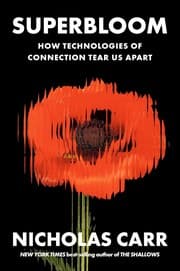
Superbloom
by Nicholas Carr
Explores how digital connectivity increases social fragmentation; a critical look at modern media’s effects on human connection.
Why this book matters now:
- •The book's exploration of digital connectivity and social fragmentation is particularly relevant in the context of political conflict and misinformation, as seen in the ongoing investigations into the January 6 events and the public discourse surrounding it.
- •With the merging of governance and content creation highlighted in recent news, 'Superbloom' provides critical insights into how media influences public perception and societal divisions, which is evident in discussions about vaccine hesitancy and drug pricing.
- •The themes of addiction and recovery discussed in the book resonate with current issues of public health, particularly in relation to the challenges faced by those leaving the prison system and accessing healthcare.
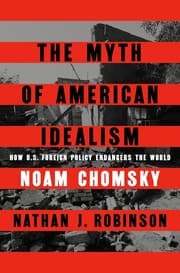
The Myth of American Idealism
by Noam Chomsky & Nathan J. Robinson
Critique of U.S. foreign policy exposing how power, not principle, drives American actions globally.
Why this book matters now:
- •The book critiques the motivations behind U.S. foreign policy, shedding light on how power dynamics shape current global conflicts, which relates to ongoing geopolitical tensions.
- •Chomsky and Robinson's analysis of American idealism contrasts sharply with contemporary political narratives, such as those surrounding the January 6 investigation, revealing how historical distortions influence present political discourse.
- •The exploration of systemic patterns in governance and power can provide insights into current issues like healthcare policy, especially in light of ongoing debates about drug pricing and public health crises like measles outbreaks.
Embracing Hope
by Viktor Frankl
Newly released collection of Frankl’s essays and talks on meaning, hope, freedom, and responsibility.
Why this book matters now:
- •Viktor Frankl's exploration of meaning and hope is particularly relevant in the context of ongoing political conflict and societal division, as individuals struggle to find purpose amid chaos.
- •The themes of freedom and responsibility in Frankl's work resonate with current discussions around public health policies, such as vaccine mandates and the responsibilities of individuals versus the collective, especially in light of rising vaccine exemptions and outbreaks like measles.
- •In an age dominated by technology and information overload, Frankl's insights into human nature and the search for meaning can help individuals navigate the complexities of misinformation and distorted narratives, as seen in the political landscape surrounding events like the Jan. 6 investigation.
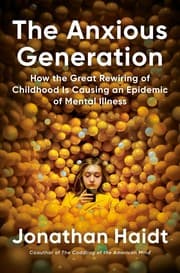
The Anxious Generation
by Jonathan Haidt
Examines the causes of the youth mental health crisis in the smartphone era and how to build a healthier childhood.
Why this book matters now:
- •The book addresses the mental health crisis among youth, which is increasingly relevant as reports of anxiety and depression rise in the context of social media and technology use, tying into broader health discussions.
- •It explores the impact of technology on childhood development, which is crucial as current events highlight the role of technology in society, including its effects on political discourse and social behavior.
- •Understanding the psychological effects of the smartphone era can provide insights into the behavior of younger generations as they engage with current political conflicts and societal issues.
The Man Who Understood Democracy
by Olivier Zunz
Biography of Alexis de Tocqueville and his contributions to political thought and democracy.
Why this book matters now:
- •Alexis de Tocqueville's insights into democracy and civil society provide valuable historical context for current political tensions and debates surrounding democratic governance, particularly in light of events like the January 6th Capitol insurrection.
- •Tocqueville's analysis of social conditions and civic engagement is pertinent to understanding the rise of populism, the role of media in shaping public opinion, and how these dynamics play out in contemporary politics, such as in the investigations into political events and figures.
- •The book emphasizes the importance of civic responsibility and the potential threats to democracy, which mirrors current concerns about misinformation, public health responses (like vaccine skepticism), and the influence of technology on democratic processes.
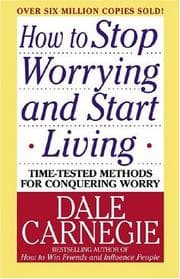
How to Stop Worrying and Start Living
by Dale Carnegie
Classic self-help with practical strategies to reduce worry and live a fulfilling life.
Why this book matters now:
- •The book addresses the pervasive anxiety and worry that many people experience in the face of current events, such as political strife, health crises, and economic uncertainty. It provides practical strategies for managing stress and fostering resilience.
- •In a time when misinformation and conflict are prevalent, Carnegie's principles of focusing on the present and taking actionable steps can help individuals navigate the overwhelming news cycle and maintain their mental health.
- •The book's focus on human relationships and communication is crucial in today's polarized political climate, where understanding and empathy can lead to more constructive discourse and conflict resolution.
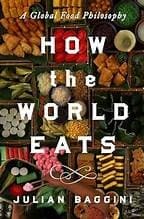
How the World Eats
by Julian Baggini
Overview of global food systems across history and culture, exploring ethical, practical, and philosophical dimensions of eating.
Why this book matters now:
- •The book explores the ethical and practical dimensions of food systems, which are increasingly relevant in discussions about health, nutrition, and access to food amid global crises like pandemics and economic instability.
- •As governments and organizations grapple with issues like food security and the ethics of food production, the philosophical inquiries presented in the book provide a framework for understanding the complexities of these contemporary challenges.
- •The intersection of technology and food systems is increasingly pertinent, as advances in agricultural technology and biotechnology play a critical role in addressing global hunger and health issues. The book's historical perspective can inform current debates about the implications of these technologies.
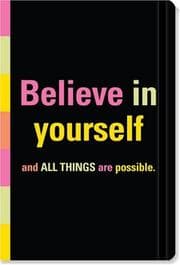
Believe
by Ross Douthat
Accessible apologetic for religious faith in the modern age by NYT columnist.
Why this book matters now:
- •The book addresses the role of faith in a rapidly changing world, which is relevant as people grapple with the moral implications of political conflicts and health crises, such as the vaccine exemptions related to the measles outbreak.
- •Douthat explores the intersection of religion and modernity, which parallels current debates around technology, misinformation, and how these affect public perception and societal values, as seen in the political narratives surrounding events like January 6.
- •In times of societal upheaval and division, the need for a cohesive belief system can drive discussions about faith, purpose, and community, which are crucial in understanding the psychological aspects of addiction and recovery highlighted in current news.
Herald of a Restless World
by Emily Herring
Biography of philosopher Henri Bergson and his enduring insights into time, memory, and creativity.
Why this book matters now:
- •Henri Bergson's insights into time and memory can help individuals and societies reflect on the historical narratives shaping current political conflicts, such as the varying interpretations of the Jan. 6 events.
- •Bergson's exploration of creativity can provide a philosophical framework for understanding the intersection of technology and governance, especially as seen in Minnesota, where content creation is influencing political processes.
- •The philosophical themes of human nature, particularly in relation to memory and perception, are relevant to discussions about public health, such as vaccine hesitancy and the spread of diseases like measles.
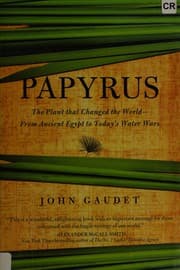
Papyrus
by Irene Vallejo
Sweeping history of the book from oral tradition to papyrus scrolls, libraries, and the birth of literature.
Why this book matters now:
- •The exploration of oral tradition and the evolution of literature in 'Papyrus' highlights the importance of historical narratives in shaping contemporary discourse, particularly in understanding how narratives around events like January 6 can be constructed and contested.
- •The book's examination of libraries and the dissemination of knowledge is particularly relevant in an age where misinformation and tech-driven narratives can distort public understanding of events, echoing current concerns about fact-checking and historical accuracy.
- •Vallejo's focus on the evolution of communication through written forms underscores the importance of technology in shaping political discourse, drawing parallels to how new media influences public perception and governance today.
Don't Believe Everything You Think
by Joseph Nguyen
Simple guide to ending psychological suffering by changing one’s relationship to thoughts, with practical exercises.
Why this book matters now:
- •The book emphasizes changing one's relationship to thoughts, which can be particularly useful in times of political conflict and misinformation, helping individuals to critically assess narratives presented in the news.
- •In the context of health debates, particularly around vaccine hesitancy and misinformation, the principles in the book can aid individuals in reframing their thoughts to better accept scientific evidence and public health guidance.
- •As technology continues to influence public opinion and mental health through social media, the book's exercises can help individuals navigate their thoughts and emotional responses to a constantly shifting digital landscape.
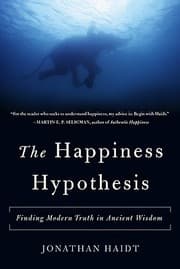
The Happiness Hypothesis
by Jonathan Haidt
Comparative look at ancient wisdom and modern science to unpack the keys to happiness.
Why this book matters now:
- •The book explores the interplay between ancient wisdom and modern science, providing insights into human happiness that can help contextualize the psychological impacts of current events such as political conflict and public health crises.
- •Haidt's examination of moral psychology and societal behavior can help explain the polarized responses to current political events, such as the investigations into January 6 and public reactions to vaccine mandates and health policies.
- •The discussion of well-being in the context of technology and its influence on happiness is particularly relevant as society navigates the rapid advancements in technology and their implications for mental health and social interaction.
Why these books?
Our AI analyzes current events and identifies books that offer historical parallels, philosophical insights, or deeper understanding of today's challenges. Books remain on this list as long as they're relevant to ongoing events.
Want to know the specific news driving these recommendations? Subscribe to Philosophers Read the News for detailed analysis.